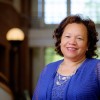This article is more than 5 years old.
I walked over to see Lynn receive her most deserving award early yesterday morning and the weather was absolutely beautiful.After the award program I ran out to serve on a focus group hosted by PROQUEST to discuss the future of microfilm.I joined representatives from eight other universities, includng Duke an NCCU, each enticed to share with the promise of a $35 Amazon gift card.From the conversations, it appears that most of those represented had stories very similar to ours. Stories that reflected a declining need for microfilm, a slight resistance by just a few faculty members and graduate students to let go, frustrations in finding new homes for there old collections and moral issues over discarding items that libraries initially paid mega dollars for.Here’s a sampling of the questions we discussed .
What would you say is the state of microfilm in your library?
What kind of content is most appropriate for microfilm?
Do you feel that the standards of digitization are appropriate and agreed upon by all?
What should be the future of microfilm?
What would you say are current hot research topics on your campus?
My committee meeting required a shuttle ride, but fortunately I had plenty time to get there.The ALA Committee on Library Advocacyis chaired by Carol Brey Casiano.We spent most of our meeting time hearing an update from our ALA liaison.Her latest registration numbers for this conference exceeded 27,000 when another 7,000attendees did onsite registrations.Exhibits unfortunately, but to be expected, were down aboutfrom last year.The ALA Office for Library Advocacyhad a busy spring and summer jumping to the aid of libraries in Ohio and Connecticut as state officials were insisting on enforcing major cuts to libraries in those states.Other projects in the works include issuing a recommendation to ALA Standards concerning advocacy as a part of library education, continuingto updaethe advocacy university website and planning for our next steps.
On my waydown to the convention center and in need of lunch, I and another Librarian found our way to a nearby Burger King for a modest lunch.This need for thrift was brought on by convention center pizza prices @ $11 a slice.While waiting for my next session the Management Mix: Mentoring Librarians for the Realities of Management to begin, I finished my lunch and began a mental game.The three presenters Kimberly, Terri and Mimi, were in the room preparing audio, etc.I could not see there name tags but decided I would guess which was one was which.My rationale Kimberly would be tall and lean, a Terri would be short and petite, and Mimi could be the more mature of the group.I was tickled as I got them all right.It made me wonder what people think of when they hear Wanda.I chose this particular session to hear about the mentoring components.Each presenter had a slightly different take on it but each agreed that mentoring goes well beyond training, it enhances leadership development, it benefits both the mentor and the mentee, and most definitely strengthens the organization as a whole.Effective mentoring requires an investment in training for both the mentor and the mentee.The Ohio based program shared by one presenter, was similar toour NC Leadership Institute.The second presenter took the viewpoint of manager as mentor.She stressed the importance ofday one on the job and how on that day the supervisordemonstrates how much she cares about his/her success in their new role.Also the leader lays out the grand plan for this position and finally how confident he/she is in their ability to get it done. The final presenter targeted public libraries and branch orientation.
My final sessionwasentitled “Improving User Services Through Open Source Solutions: Potentials and Pitfalls. Featured amongthe panel of open source experts was Joseph Lucia, Villanova University,who spoke concerning the need for open source,benefits to libraries and why it is a most viable but necessary option.Randy Dykhuls shared insights on the Michigan Library Consortium’s implementation of Evergreen.John Garino, St John”s University focused his remarks on the WALDO Library Consortium’s selection of Koha as their open source option for their 15 member libraries.The final panelist I did not hear as I had to leave early for a Random House sponsored dinner with Carlotta Walls Lanier author of “A Mighty Long Way, My Journey to Justice at little Rock Central High School.”
Dinner was very nice but rushed for me as BCALA had a memorial tribute for Dr. E. J. Josey its’ founder and library activist, pioneer in the pursuit of African Americans and their inclusion in the American Library Association. Dr Josey was funeralized in NC on Saturday.

3 Comments on ‘Wanda @ ALA day 3’
Future of microfilm? What a grim topic!
The future: the recycle bin 🙂
🙂 The comments made me chuckle.
Sessions on mentoring *and* on Open Source? Sounds like a great afternoon!